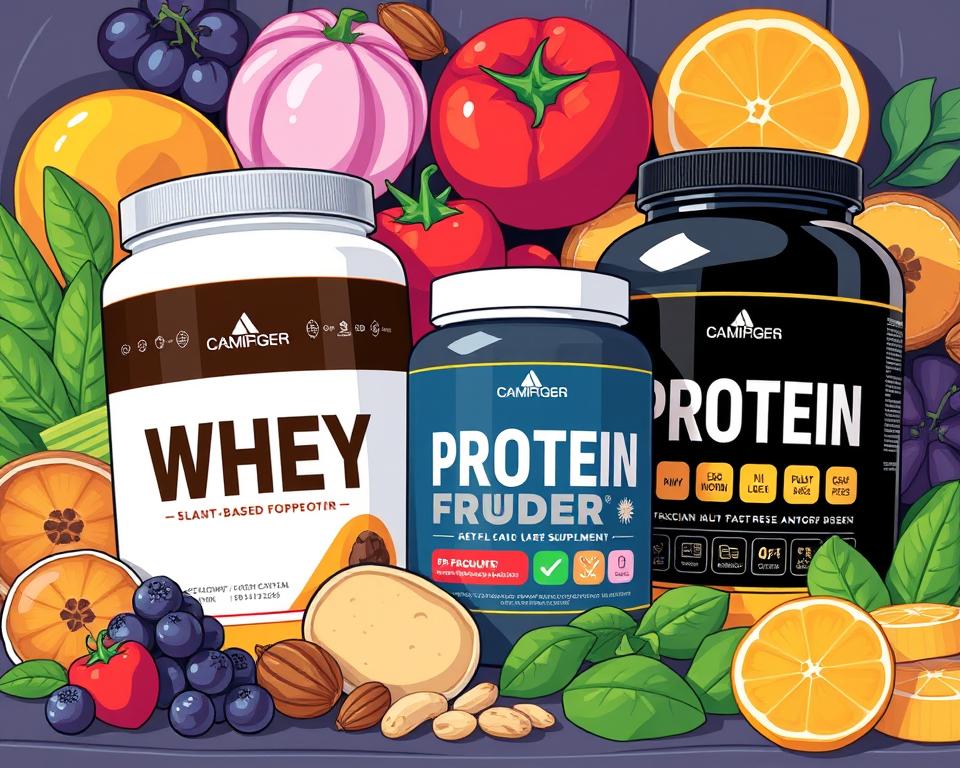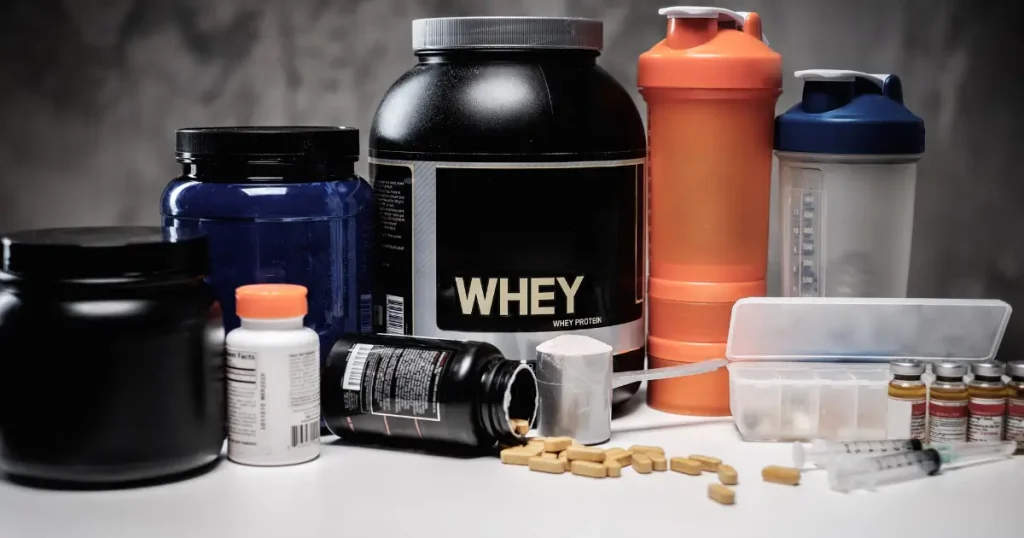bodybuilding & Fitness
The Ultimate Guide to Protein Supplements
Starting a fitness journey means exploring the world of nutrition and supplements. Protein supplements are very popular. They help with muscle building, weight management, and recovery. This guide will help you understand protein supplements and make choices that fit your health and fitness goals.
There are many types of protein supplements, each with its own benefits. Whether you’re an athlete, gym-goer, or just want to improve your health, this guide is for you. We’ll cover the different types, ingredients, benefits, and side effects. This will help you use protein supplements in your life effectively.
Your personal needs and preferences are key in choosing the right protein supplement. By reading this guide, you’ll learn how to set health goals, understand protein sources, and make smart choices. Let’s start and see how protein supplements can help you become healthier and stronger.
What Are Protein Supplements?
Protein supplements are concentrated sources of protein from various foods. They come in forms like powders, bars, and shakes. They make it easy to increase your protein intake.
Definition and Types
These supplements give a high dose of protein, key for muscle growth and repair. They vary by protein type, such as whey protein, casein protein, and plant-based proteins like soy, pea, or rice.
Common Ingredients
Protein supplements also have other ingredients. These include amino acids, vitamins, minerals, and carbs or fats. These add-ons boost the supplement’s nutritional value and offer extra benefits.
Benefits of Protein Supplements
Adding protein powder to your diet has many advantages. These include:
- Support for muscle growth and maintenance
- Improved recovery from exercise and physical activity
- Convenient source of amino acids and high-quality protein
- Potential weight management benefits when used as part of a balanced diet
Knowing the types and ingredients in protein supplements helps you pick the best one for your health and fitness goals.
“Protein supplements can be a valuable addition to a balanced diet, providing a convenient way to boost your daily protein intake.”
Why Do People Use Protein Supplements?
Protein supplements are popular among those who work out and care about their health. They meet different fitness goals and needs. Let’s look at why people use protein supplements.
Muscle Building
People who want to build and keep lean muscle mass find protein supplements helpful. They offer a lot of high-quality amino acids, which are key for muscle growth. These supplements give the body extra protein, helping muscles grow and heal, especially with strength training.
Weight Management
Protein supplements can also help with weight loss and keeping weight off. They have a lot of protein, which can make you feel full. This can help you eat less and support a healthy fitness nutrition plan and weight loss goals.
Recovery Support
Working out hard can make muscles tired and sore. Protein supplements help by giving the body what it needs to fix and grow muscles. They help speed up recovery, so you can get back to working out sooner.
“Protein supplements have become an essential tool for athletes, bodybuilders, and fitness enthusiasts looking to support their fitness goals.”
Different Types of Protein Supplements
Choosing the right protein supplement is key for muscle building, weight maintenance, or recovery. Let’s look at whey, casein, and plant-based options. This will help you pick the best one for you.
Whey Protein
Whey protein is a fast-absorbing favorite among athletes and fitness fans. It comes from dairy and quickly gives your body amino acids. This makes it great for recovery and building muscle after workouts.
Its ease of use and benefits have made it a top protein powder choice.
Casein Protein
Casein protein is slow-releasing, giving amino acids over time. It’s best for overnight recovery and keeping muscles strong. It’s not as quick as whey but helps prevent muscle loss and aids in repair.
Plant-Based Protein
For vegetarians or vegans, plant-based protein is a great option. Made from pea, rice, and hemp, these protein powders have all the amino acids you need. They’re a good choice for those looking for dairy-free, eco-friendly protein sources.
While not as common as whey or casein, plant-based proteins are becoming more popular among health-focused people.
The right protein supplement depends on your goals, diet, and lifestyle. Knowing the benefits of whey, casein, and plant-based proteins helps you choose the best one for your fitness journey.
“Choosing the right protein supplement can be a game-changer in reaching your health and fitness objectives.”
How to Choose the Right Protein Supplement
Finding the right protein supplement can seem hard. But, with the right steps, you can pick the best one for you. First, think about your health goals. Then, learn about different protein sources and read labels carefully.
Assessing Your Health Goals
Start by thinking about what you want to achieve. Do you want to build muscle, lose weight, or recover faster? Knowing your goals helps you find the right protein supplement. For example, if you want to build muscle, look for supplements with more BCAAs like leucine, isoleucine, and valine.
Understanding Protein Sources
Protein supplements come from various sources. Each has its own amino acid mix and how it’s absorbed. Learn about whey, casein, and plant-based proteins to choose what fits your diet and needs. Also, think about any food allergies or intolerances that might affect your choice.
Reading Labels and Ingredients
When picking a protein supplement, check the label and ingredients list. Look for products that are high-quality and don’t have extra stuff like fillers or artificial sweeteners. Make sure it has a good mix of amino acids, including the essential ones your body needs.
“Choosing the right protein supplement is essential for optimizing your dietary supplements and achieving your fitness goals.”
By understanding your needs, knowing about protein sources, and checking labels, you can choose a amino acids product that’s good for your health and fitness.
Recommended Dosages for Protein Supplements
Adding protein powder to your fitness routine is a smart move. But knowing the right amount is key to getting the most out of it. The amount you should take depends on your weight, how active you are, and what you want to achieve.
General Recommendations
Experts usually say to aim for 1.6 to 2.2 grams of protein for every kilogram of your body weight each day. This can change if you’re trying to build muscle or if you’re an athlete.
Timing for Maximum Benefit
- For muscle growth and recovery, take protein supplements within 30 minutes before or after your workout.
- For daily protein, you can take it with meals or as a snack throughout the day.
Considerations for Different Lifestyles
How much protein powder you need can change based on your lifestyle and goals:
- Athletes and Bodybuilders: They might need 2 to 3 grams of protein per kilogram of body weight for muscle growth and recovery.
- Recreational Gym-Goers: Those who just want to stay fit and manage their weight might do well with 1.6 to 2 grams of protein per kilogram of body weight.
- Sedentary Individuals: People who don’t move much might only need 1.2 to 1.6 grams of protein per kilogram of body weight.
It’s important to listen to your body and try different amounts of protein powder. Also, talking to a healthcare professional or a registered dietitian can help find the best protein intake for you.
Popular Protein Supplement Brands
There are a few top brands in the protein supplement market. These companies are known for their high-quality products. They meet the needs of different fitness and dietary goals. Let’s explore some of the most popular brands.
Optimum Nutrition
Optimum Nutrition is a well-known name in whey protein supplements. Their Gold Standard 100% Whey is a top choice. They offer many whey protein powders to help with muscle growth and recovery. Their products are made with top ingredients and are known for great taste and results.
BSN
BSN, or Bionic Sports Nutrition, is a big name in dietary supplements. They have a wide range of protein products for athletes and fitness lovers. From Syntha-6 to specialized formulas, BSN’s products are packed with nutrients to help reach fitness goals.
Garden of Life
Garden of Life is popular for plant-based protein options. They focus on organic, non-GMO, and vegan-friendly supplements. Their protein powders come from plants like pea, hemp, and brown rice. These options are great for those looking for clean and sustainable protein.
When picking a protein supplement, think about your health goals, diet, and the ingredients. Exploring these top brands can help you find the right supplement for your fitness journey.

“Choosing the right protein supplement can be a game-changer in your fitness and nutrition routine.” – Fitness Expert, Jane Doe
How to Incorporate Protein Supplements into Your Diet
Adding protein supplements to your daily routine can change your fitness and weight loss goals. There are many ways to use protein powder, not just in shakes. You can add it to meals and snacks for extra protein.
Smoothies and Shakes
Protein-rich smoothies and shakes are tasty and easy to make. Start your day or refuel with a blend of protein powder, fruits, greens, and a liquid like milk or yogurt. It’s a healthy and delicious choice.
Baking and Cooking
Protein powder is great in the kitchen. Try adding it to muffins, pancakes, and protein bars for more protein. You can also use it in soups, sauces, and casseroles to make them healthier.
Meal Replacement Options
Protein supplements are perfect for busy people or those trying to lose weight. Protein powder mixed with fruits, veggies, and healthy fats makes a quick, balanced meal or snack.
To successfully add protein supplements to your diet, find ways to enjoy them that you like. Try different recipes, flavors, and amounts. This will help you find the best fit for your fitness nutrition and weight loss goals.
Potential Side Effects of Protein Supplements
Dietary supplements, like protein powders, can help with fitness and health goals. But, it’s key to know about possible side effects. Understanding risks and impacts is vital, especially for long-term use.
Common Reactions
Common side effects include digestive issues like bloating, gas, or diarrhea. These problems can be worse for those with lactose intolerance or sensitivity to whey or casein. Some people might also have allergic reactions, like skin rashes or hives.
Long-Term Considerations
Long-term use of protein supplements might affect your kidney and liver health. This is especially true if you have existing conditions or take high doses. Always talk to your doctor to make sure your supplements and nutrition plan are safe for you.
When to Consult a Doctor
- If you have bad reactions, like digestive problems or allergies, after taking protein supplements.
- If you have kidney or liver disease, or plan to use protein supplements for a long time.
- If you have other health issues that could be affected by dietary supplements.
While protein supplements are useful for fitness, use them wisely. Always get advice from a healthcare professional, especially if you have health concerns.

“It’s crucial to understand the potential side effects and long-term impacts of using protein supplements, especially if you have pre-existing medical conditions or plan to use them for an extended period.”
Myths and Misconceptions About Protein Supplements
There are many myths and misconceptions about protein supplements. Let’s clear up some common ones. This will help you make better choices about your supplements.
Protein Powder vs. Whole Foods
Some think protein powder is worse than whole foods. But, this isn’t always true. Protein supplements can be a great way to get enough protein, especially if you’re active or trying to build muscle. Just make sure to pick high-quality supplements and eat a variety of whole foods too.
Misunderstandings About Weight Gain
Many believe protein supplements cause weight gain. But, protein itself doesn’t make you gain weight. Protein supplements can actually help with weight management by helping muscles grow and keeping you full.
Evaluating Quality and Effectiveness
- When picking a protein supplement, don’t just look at the marketing. Check the quality and how well it works.
- Look for third-party certifications like NSF or USP. They make sure the supplement is safe and does what it says.
- Read the label to know what’s in it, how much to take, and any extra ingredients.
- Think about what you want to achieve. Choose a supplement that fits your goals, like building muscle or losing weight.
By knowing the truth and debunking myths, you can choose the right protein supplements for your muscle growth and weight loss goals.
Future Trends in Protein Supplements
The demand for protein supplements is growing fast. The industry is coming up with new ways to meet these needs. We’re seeing everything from new protein sources to a big push for sustainability.
Innovation in Protein Sources
Whey and casein proteins are no longer the only choices. Plant-based proteins like soy, pea, and hemp are becoming more popular. People want plant-based protein for their health. We’re also seeing new sources like insects and microalgae, offering eco-friendly fitness nutrition options.
Sustainability Efforts
Sustainability is a big deal now. Both makers and buyers of dietary supplements care about the planet. Companies are working to be greener by using renewable sources and reducing waste. They’re also using materials that can be recycled or biodegrade.
Consumer Preferences Shaping the Market
What people want is changing the protein supplement world. The industry is offering more tailored options and being open about what’s in their products. This means detailed labels and knowing where the ingredients come from. We’re also seeing more fitness nutrition that can be customized for personal health goals.

